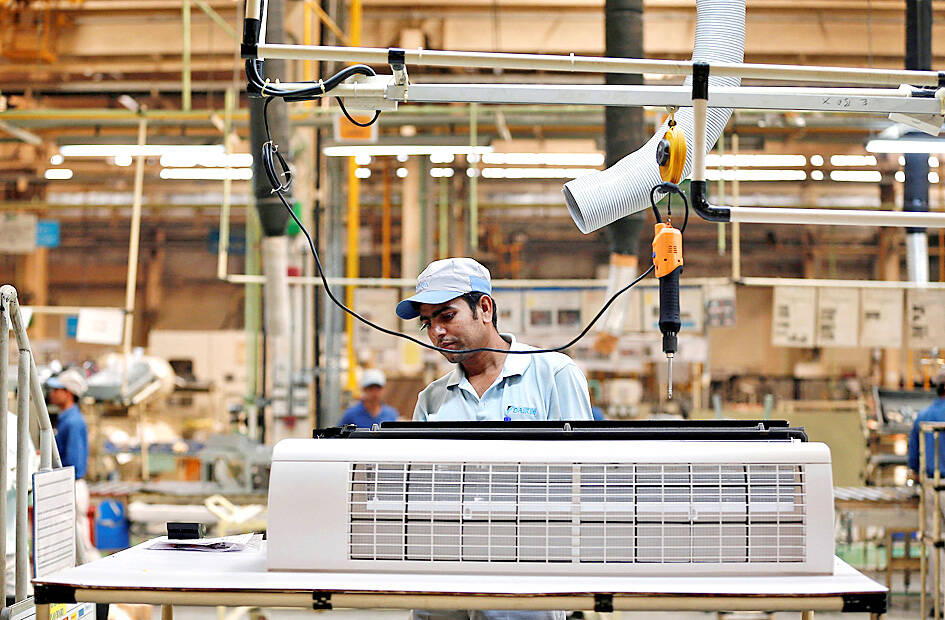Daikin Industries Ltd, the world’s largest maker of air-conditioners, is betting that sales and production in India would eventually make up a bigger part of the company as the nation outpaces global growth.
“The market has a huge potential,” said Kanwal Jeet Jawa, chief executive officer of Daikin’s India operations. “We see India as a market, post-COVID recovery, as the best among all the other markets in the world.”
The goal is to more than double sales by 2025, after boosting revenue 10-fold over the past decade, Jawa said.

Photo: Reuters
Just 5 percent of India’s homes and businesses have air-conditioners, said the manufacturer, which competes against local provider Voltas Ltd.
Daikin’s global sales are poised to benefit from two key trends: global warming and growing affluence in emerging economies. A deadly heat wave in India earlier this year underscored the need for better access to cooling products, as well as the need for supporting infrastructure.
The local market is worth about ¥300 billion (US$2.1 billion), the company said.
Daikin is currently building a third factory in India, investing ¥15 billion in a facility that can produce 3 million units a year.
The company is seeking to ramp up production for domestic buyers, as well as for export to the Middle East and Africa, said Jawa, who is also the only foreigner on Daikin’s board.
“We have a huge opportunity in the Middle East and Africa as far as we are concerned,” Jawa said.

Jensen Huang (黃仁勳), founder and CEO of US-based artificial intelligence chip designer Nvidia Corp and Taiwan Semiconductor Manufacturing Co (TSMC, 台積電) on Friday celebrated the first Nvidia Blackwell wafer produced on US soil. Huang visited TSMC’s advanced wafer fab in the US state of Arizona and joined the Taiwanese chipmaker’s executives to witness the efforts to “build the infrastructure that powers the world’s AI factories, right here in America,” Nvidia said in a statement. At the event, Huang joined Y.L. Wang (王英郎), vice president of operations at TSMC, in signing their names on the Blackwell wafer to

AI BOOST: Although Taiwan’s reliance on Chinese rare earth elements is limited, it could face indirect impacts from supply issues and price volatility, an economist said DBS Bank Ltd (星展銀行) has sharply raised its forecast for Taiwan’s economic growth this year to 5.6 percent, citing stronger-than-expected exports and investment linked to artificial intelligence (AI), as it said that the current momentum could peak soon. The acceleration of the global AI race has fueled a surge in Taiwan’s AI-related capital spending and exports of information and communications technology (ICT) products, which have been key drivers of growth this year. “We have revised our GDP forecast for Taiwan upward to 5.6 percent from 4 percent, an upgrade that mainly reflects stronger-than-expected AI-related exports and investment in the third

RARE EARTHS: The call between the US Treasury Secretary and his Chinese counterpart came as Washington sought to rally G7 partners in response to China’s export controls China and the US on Saturday agreed to conduct another round of trade negotiations in the coming week, as the world’s two biggest economies seek to avoid another damaging tit-for-tat tariff battle. Beijing last week announced sweeping controls on the critical rare earths industry, prompting US President Donald Trump to threaten 100 percent tariffs on imports from China in retaliation. Trump had also threatened to cancel his expected meeting with Chinese President Xi Jinping (習近平) in South Korea later this month on the sidelines of the APEC summit. In the latest indication of efforts to resolve their dispute, Chinese state media reported that

CHINESE EXPORT CURBS: A dispute between China and the Netherlands could halt chip supply, affecting vehicle production, US and European auto associations said Groups representing major automakers late on Thursday warned that a chip disruption stemming from a dispute between China and the Dutch government could quickly affect US auto production. Automakers and their suppliers received notice from chipmaker Nexperia (安世半導體) last week that it could no longer guarantee delivery of its chips, the European Automobile Manufacturers Association said, adding that manufacturing could be significantly disrupted. In the US, the Alliance for Automotive Innovation, which represents General Motors, Toyota, Ford, Volkswagen, Hyundai and nearly all other major automakers, urged a quick resolution. “If the shipment of automotive chips doesn’t resume — quickly — it’s going to